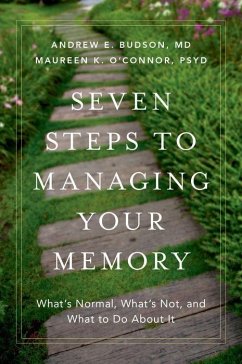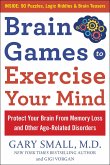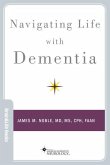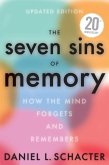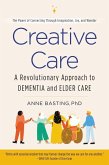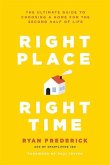Andrew E. Budson (Prof, Prof, Boston University School of Medicine), O'Connor, Maureen K., Psy.D (Prof, Prof, Boston University School of
Seven Steps to Managing Your Memory
What's Normal, What's Not, and What to Do about It
Andrew E. Budson (Prof, Prof, Boston University School of Medicine), O'Connor, Maureen K., Psy.D (Prof, Prof, Boston University School of
Seven Steps to Managing Your Memory
What's Normal, What's Not, and What to Do about It
- Gebundenes Buch
- Merkliste
- Auf die Merkliste
- Bewerten Bewerten
- Teilen
- Produkt teilen
- Produkterinnerung
- Produkterinnerung
Provides information on how to manage age-related memory loss, discussing such key concerns as the signs that suggest memory problems are more than normal aging and medicines, alternative therapies, diets, and exercises for improving memory.
Andere Kunden interessierten sich auch für
![Brain Games to Exercise Your Mind: Protect Your Brain from Memory Loss and Other Age-Related Disorders Brain Games to Exercise Your Mind: Protect Your Brain from Memory Loss and Other Age-Related Disorders]() Gary SmallBrain Games to Exercise Your Mind: Protect Your Brain from Memory Loss and Other Age-Related Disorders19,99 €
Gary SmallBrain Games to Exercise Your Mind: Protect Your Brain from Memory Loss and Other Age-Related Disorders19,99 €![Beyond the Archive Beyond the Archive]() Jens Brockmeier (The American University o Professor of PsychologyBeyond the Archive152,99 €
Jens Brockmeier (The American University o Professor of PsychologyBeyond the Archive152,99 €![Aging Thoughtfully Aging Thoughtfully]() Martha C. NussbaumAging Thoughtfully27,99 €
Martha C. NussbaumAging Thoughtfully27,99 €![Navigating Life with Dementia Navigating Life with Dementia]() James M. Noble (MD, MS, CPH, FAAN, MD, MS, CPH, FAAN, Associate ProNavigating Life with Dementia20,99 €
James M. Noble (MD, MS, CPH, FAAN, MD, MS, CPH, FAAN, Associate ProNavigating Life with Dementia20,99 €![The Seven Sins of Memory Updated Edition The Seven Sins of Memory Updated Edition]() Daniel L. SchacterThe Seven Sins of Memory Updated Edition15,99 €
Daniel L. SchacterThe Seven Sins of Memory Updated Edition15,99 €![Creative Care Creative Care]() Anne BastingCreative Care17,99 €
Anne BastingCreative Care17,99 €![Right Place, Right Time Right Place, Right Time]() Ryan Frederick (SmartLiving 360)Right Place, Right Time18,99 €
Ryan Frederick (SmartLiving 360)Right Place, Right Time18,99 €-
-
-
Provides information on how to manage age-related memory loss, discussing such key concerns as the signs that suggest memory problems are more than normal aging and medicines, alternative therapies, diets, and exercises for improving memory.
Hinweis: Dieser Artikel kann nur an eine deutsche Lieferadresse ausgeliefert werden.
Hinweis: Dieser Artikel kann nur an eine deutsche Lieferadresse ausgeliefert werden.
Produktdetails
- Produktdetails
- Verlag: Oxford University Press Inc
- Seitenzahl: 342
- Erscheinungstermin: 1. August 2017
- Englisch
- Abmessung: 239mm x 163mm x 30mm
- Gewicht: 592g
- ISBN-13: 9780190494957
- ISBN-10: 0190494956
- Artikelnr.: 47867224
- Herstellerkennzeichnung
- Libri GmbH
- Europaallee 1
- 36244 Bad Hersfeld
- 06621 890
- Verlag: Oxford University Press Inc
- Seitenzahl: 342
- Erscheinungstermin: 1. August 2017
- Englisch
- Abmessung: 239mm x 163mm x 30mm
- Gewicht: 592g
- ISBN-13: 9780190494957
- ISBN-10: 0190494956
- Artikelnr.: 47867224
- Herstellerkennzeichnung
- Libri GmbH
- Europaallee 1
- 36244 Bad Hersfeld
- 06621 890
Andrew E. Budson, MD, majored in chemistry and philosophy at Haverford College before receiving his medical degree from Harvard Medical School. Dr. Budson is Professor of Neurology at Boston University, Lecturer in Neurology at Harvard Medical School, and Chief of Cognitive & Behavioral Neurology at the Veterans Affairs Boston Healthcare System. His career combines education, research, and clinical care to help those with memory disorders. Maureen K. O'Connor, PsyD, was educated at Ithaca College, Indiana University of Pennsylvania, and Yale University School of Medicine. Dr. O'Connor is Assistant Professor of Neurology at Boston University, Director of Neuropsychology at the Bedford Veterans Affairs Hospital, and Member at Large of the National Academy of Neuropsychology. Her award-winning research, education, and clinical care focuses on patients with memory disorders.
* Table of Contents
* Chapter 1: Is My Memory Normal?
* Chapter 2: Will My Memory Get Better? Which Causes of Memory Loss Are
Reversible?
* Chapter 3: I'm Worried My Memory Isn't Normal. How Do I Get it
Checked Out?
* Chapter 4: What Should the Doctor Do to Evaluate My Memory?
* Chapter 5: What Does It Mean if It Is Mild Cognitive Impairment?
* Chapter 6: What Does It Mean if It Is Dementia?
* Chapter 7: What Is Alzheimer's Disease?
* Chapter 8: What Is Vascular Dementia?
* Chapter 9: What Is Dementia with Lewy Bodies and Parkinson's Disease
Dementia?
* Chapter 10: What if It Is Something Else? What Are the Other Causes
of Dementia?
* Chapter 11: How Can We Treat Memory Loss?
* Chapter 12: Can Vitamins, Herbs, and Nutritional Supplements Help?
* Chapter 13: I'm Feeling a Bit Anxious and Depressed by My Memory
Loss. What Should I
* Do About These Feelings?
* Chapter 14: What Foods Should I Eat or Avoid to Help My Memory Loss?
* Chapter 15: Can Physical Activity and Exercise Help My Memory Loss?
* Chapter 16: Are There Mental Exercises or Strategies that Can Help My
Memory?
* Chapter 17: Do I Need to Stop Working? Can I Still Drive? Do I Need
an Attorney? What Do I Tell My Friends and Family?
* Chapter 18: Where Can I Get More Help?
* Chapter 1: Is My Memory Normal?
* Chapter 2: Will My Memory Get Better? Which Causes of Memory Loss Are
Reversible?
* Chapter 3: I'm Worried My Memory Isn't Normal. How Do I Get it
Checked Out?
* Chapter 4: What Should the Doctor Do to Evaluate My Memory?
* Chapter 5: What Does It Mean if It Is Mild Cognitive Impairment?
* Chapter 6: What Does It Mean if It Is Dementia?
* Chapter 7: What Is Alzheimer's Disease?
* Chapter 8: What Is Vascular Dementia?
* Chapter 9: What Is Dementia with Lewy Bodies and Parkinson's Disease
Dementia?
* Chapter 10: What if It Is Something Else? What Are the Other Causes
of Dementia?
* Chapter 11: How Can We Treat Memory Loss?
* Chapter 12: Can Vitamins, Herbs, and Nutritional Supplements Help?
* Chapter 13: I'm Feeling a Bit Anxious and Depressed by My Memory
Loss. What Should I
* Do About These Feelings?
* Chapter 14: What Foods Should I Eat or Avoid to Help My Memory Loss?
* Chapter 15: Can Physical Activity and Exercise Help My Memory Loss?
* Chapter 16: Are There Mental Exercises or Strategies that Can Help My
Memory?
* Chapter 17: Do I Need to Stop Working? Can I Still Drive? Do I Need
an Attorney? What Do I Tell My Friends and Family?
* Chapter 18: Where Can I Get More Help?
* Table of Contents
* Chapter 1: Is My Memory Normal?
* Chapter 2: Will My Memory Get Better? Which Causes of Memory Loss Are
Reversible?
* Chapter 3: I'm Worried My Memory Isn't Normal. How Do I Get it
Checked Out?
* Chapter 4: What Should the Doctor Do to Evaluate My Memory?
* Chapter 5: What Does It Mean if It Is Mild Cognitive Impairment?
* Chapter 6: What Does It Mean if It Is Dementia?
* Chapter 7: What Is Alzheimer's Disease?
* Chapter 8: What Is Vascular Dementia?
* Chapter 9: What Is Dementia with Lewy Bodies and Parkinson's Disease
Dementia?
* Chapter 10: What if It Is Something Else? What Are the Other Causes
of Dementia?
* Chapter 11: How Can We Treat Memory Loss?
* Chapter 12: Can Vitamins, Herbs, and Nutritional Supplements Help?
* Chapter 13: I'm Feeling a Bit Anxious and Depressed by My Memory
Loss. What Should I
* Do About These Feelings?
* Chapter 14: What Foods Should I Eat or Avoid to Help My Memory Loss?
* Chapter 15: Can Physical Activity and Exercise Help My Memory Loss?
* Chapter 16: Are There Mental Exercises or Strategies that Can Help My
Memory?
* Chapter 17: Do I Need to Stop Working? Can I Still Drive? Do I Need
an Attorney? What Do I Tell My Friends and Family?
* Chapter 18: Where Can I Get More Help?
* Chapter 1: Is My Memory Normal?
* Chapter 2: Will My Memory Get Better? Which Causes of Memory Loss Are
Reversible?
* Chapter 3: I'm Worried My Memory Isn't Normal. How Do I Get it
Checked Out?
* Chapter 4: What Should the Doctor Do to Evaluate My Memory?
* Chapter 5: What Does It Mean if It Is Mild Cognitive Impairment?
* Chapter 6: What Does It Mean if It Is Dementia?
* Chapter 7: What Is Alzheimer's Disease?
* Chapter 8: What Is Vascular Dementia?
* Chapter 9: What Is Dementia with Lewy Bodies and Parkinson's Disease
Dementia?
* Chapter 10: What if It Is Something Else? What Are the Other Causes
of Dementia?
* Chapter 11: How Can We Treat Memory Loss?
* Chapter 12: Can Vitamins, Herbs, and Nutritional Supplements Help?
* Chapter 13: I'm Feeling a Bit Anxious and Depressed by My Memory
Loss. What Should I
* Do About These Feelings?
* Chapter 14: What Foods Should I Eat or Avoid to Help My Memory Loss?
* Chapter 15: Can Physical Activity and Exercise Help My Memory Loss?
* Chapter 16: Are There Mental Exercises or Strategies that Can Help My
Memory?
* Chapter 17: Do I Need to Stop Working? Can I Still Drive? Do I Need
an Attorney? What Do I Tell My Friends and Family?
* Chapter 18: Where Can I Get More Help?

